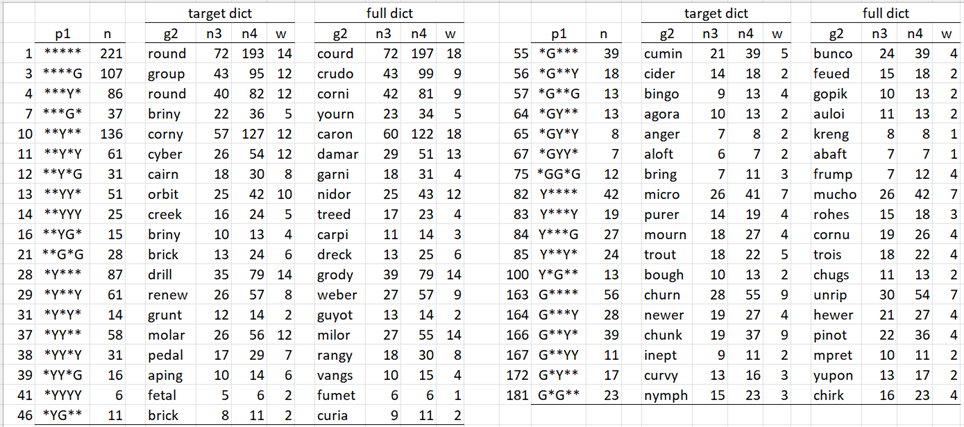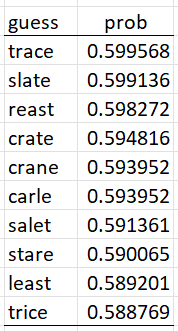Objective
In Best First and Second Guesses, we show how to select the best first and/or second guess in Wordle, when we restrict our choices to the words in the basic dictionary consisting of the 2,315 target words. On this webpage, we show how to modify this approach when guesses can come from the full, 12,497-word, dictionary.
In Figure 3 of Best First and Second Guesses, we display the best second guesses from the basic dictionary after an initial guess of “slate”. It is possible that a second guess from the full dictionary will increase the number of non-zero patterns and therefore improve your chances of guessing the target word in 3 tries. This, of course, will come at the expense of eliminating the chance of success in two tries.
Example after “slate”
Figure 1 shows the patterns from Figure 3 of Best First and Second Guesses where you can improve your odds of winning in three tries by picking a word from the full dictionary as your second guess. E.g. we see that when Wordle returns a pattern of “G**Y*” after “slate” as the first guess, a second guess of “pinot” results in more non-zero patterns than “chunk”, 22 vs. 19, and so “pinot” improves your odds of winning within 3 tries. For the pattern “*GG*G”, “frump” doesn’t improve your odds of winning within 3 tries, but it does improve your odds over “bring” of winning in 4 tries if your attempt to win in 3 tries fails.
Figure 1 – Improved second guess after “slate”
Note that for pattern “**YG*”, we could also use “pyric” as a second guess. It has the same chance of winning in 3 or 4 tries as “carpi”, but its worst-case is 4 instead of 3. Similarly, for “*Y**Y”, the more common word “riven” can be used instead of “weber” with the same probability of winning in 3 or 4 tries, but with the worst-case increasing from 9 to 12. Finally, we can use “bangs” instead of “vangs” for “*YY*G” with a worst-case of 5 instead of 4.
It turns out that the probability of winning within 3 turns after an initial guess of “slate” improves from 1346/2315 = 58.1425% to 1387/2315 = 59.9136% when the second guess can be selected from the full dictionary.
Actually, in this case, an initial guess of “trace” is a slight improvement over “slate”, with the probability of winning within 3 turns of 1388/2315 = 59.9568%.
Revised Best First Guess
The best 10 initial guesses that we have found when we allow a word from the full dictionary as a first and/or second guess are shown in Figure 2. For each word on the list, the probability of a win within three tries is also shown.
Figure 2 – Best first guesses
This list contains three words from the full dictionary that are not in the basic dictionary, namely “reast”, “carle”, and “salet”.
Download Table
Click here to download the Excel workbook with the table in Figure 1.
References
New York Times (2022) Wordle
https://www.nytimes.com/games/wordle/index.html
Scholtes, G. (2022) Wordle dictionary. Github
https://gist.github.com/scholtes/94f3c0303ba6a7768b47583aff36654d


I don’t understand why the Wordlebot doesn’t take into account the non-repetition of solution words when showing odds?
And the same question applies to whoever says that odds of guessing the answer in the first try is one in 2315. That’s going to change each day, isn’t it?
Hi Greg,
You are correct. As long as Wordle doesn’t repeat a word, then the odds of getting the target word in the first try improves every day — as long as you keep track of the target words used in the past.
Since initially there were only 2315 target words, eventually Wordle will need to reuse the target words or add new words to the list of candidates,
I have made the simplifying assumption that the odds are 1 in 2315 since most people aren’t keeping track of previously used targets plus it is easier to provide odds based on this assumption.
Charles
My sister in law gets in in 2 try’s almost every other time…sometimes she only has 1 letter in the first try🤷♀️
Hello Dawn,
Your sister-in-law is certainly beating the odds.
Charles
The first or second time I played, I chose “train” for no reason except that it had three common consonants and two vowels, and guess what — it was correct on the first try! Sheer luck. Unfortunately, I did not know about “signing in” with an account, so that success on the first attempt does not show up on my stats. The same thing happened again (!) until I realized I should create an account! But I haven’t had another first try success since then. Maybe I shouldn’t have created an account 😂.
Your SIL is almost certainly cheating. If this was Vegas, the “eye in the sky” would be keeping a very close watch on her.